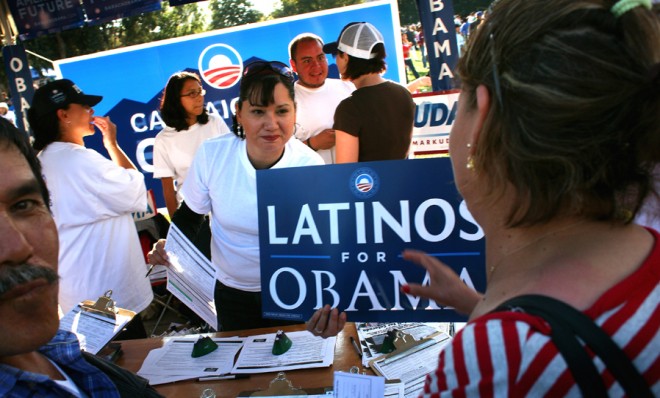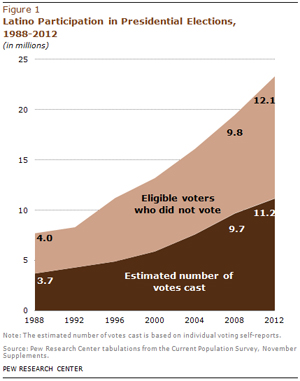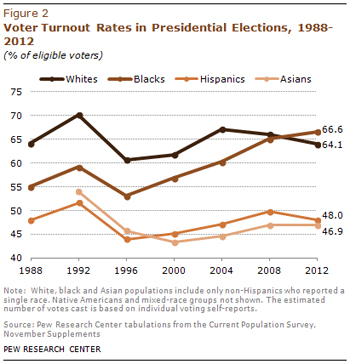Is the importance of winning the Latino vote overrated?
Despite huge population growth in the past decade, the "sleeping giant" of electoral demographics may still be slumbering


A free daily email with the biggest news stories of the day – and the best features from TheWeek.com
You are now subscribed
Your newsletter sign-up was successful
Republicans were so concerned about the party's dismal courtship of Latino voters in the 2012 election — Mitt Romney won just 27 percent of the Latino vote — that they publicly acknowledged a need to do better in the future, or face irrelevance.
Yet a new Pew Research study suggests the shifting electoral landscape may not be as perilous as previously thought. Though Latinos continued to increase their overall share of the electorate in 2012, they still lagged significantly behind other demographics in their rate of voter participation.
While a record 11.2 million Latinos voted in the 2012 presidential election, 12.1 million eligible Latino voters didn't bother to cast ballots, also a record-high.
The Week
Escape your echo chamber. Get the facts behind the news, plus analysis from multiple perspectives.

Sign up for The Week's Free Newsletters
From our morning news briefing to a weekly Good News Newsletter, get the best of The Week delivered directly to your inbox.
From our morning news briefing to a weekly Good News Newsletter, get the best of The Week delivered directly to your inbox.

While the number of eligible Latino voters grew 19 percent since 2008, from 19.5 million to 23.3 million, voter participation rose at a slower rate of 15 percent. In the end, less than half of all eligible Latino voters cast ballots — far less than the 66.6 percent and 64.1 percent turnout rates for black and white voters, respectively.
In fact, Latino voter participation actually decreased from the last presidential election.

To look at it another way, while Latinos made up 17.2 percent of the nation's population in 2012, they comprised just 8.4 percent of all voters.
"The Hispanic vote is like a raw prospect in the NBA Draft," The Washington Post's Chris Cillizza remarked. "The potential is quite clearly there but the record of accomplishment doesn’t come close to matching that potential."
A free daily email with the biggest news stories of the day – and the best features from TheWeek.com
As National Journal's Reid Wilson pointed out, an uptick in the Latino voting rate could have profoundly changed the 2012 election results. Given President Obama's huge edge with that demographic, a surge of Latino voters would have made battleground states into cakewalks, and possibly added more states to the president's win column.
If the percentage of Hispanics who cast ballots had grown to match the percentage of whites who voted, the presidential map would have changed dramatically. Those higher rates would have meant more than 1 million additional votes in California and Texas; Arizona, which voted for Romney by a 208,000-vote margin, would have added an additional 217,000 Hispanic voters. And in key battleground states such as Colorado and Nevada, close races could have turned into runaway wins for Obama. A greater emphasis on Hispanic turnout in Wisconsin, where just 44 percent of Hispanics voted and where Obama won by seven points, would have given the president a much more comfortable victory there. [National Journal]
Back in November, Pew's Mark Lopez pointed to one possible reason for the declining Latino voter rate, noting that nearly half of all Latino voters live in two states: California and Texas. Neither state, he explained, was at all competitive this year, especially given the lack of a Democratic primary to boost engagement.
However, a separate Pew report noted that Latinos are the nation's youngest ethnic group, and could therefore become far more of an active bloc down the road.
"Their median age is 27 years — and just 18 years among native-born Hispanics — compared with 42 years for that of white non-Hispanics," Lopez and his colleagues wrote. "In the coming decades, their share of the age-eligible electorate will rise markedly through generational replacement alone."
Even if the Latino voter participation rate continues to lag, the Latino share of the overall electorate will likely keep rising. In that respect, Republicans may want to take another shot at their big rebranding effort, which has already hit some major hiccups.
Jon Terbush is an associate editor at TheWeek.com covering politics, sports, and other things he finds interesting. He has previously written for Talking Points Memo, Raw Story, and Business Insider.
-
 Are Hollywood ‘showmances’ losing their shine?
Are Hollywood ‘showmances’ losing their shine?In The Spotlight Teasing real-life romance between movie leads is an old Tinseltown publicity trick but modern audiences may have had enough
-
 A dreamy long weekend on the Amalfi Coast
A dreamy long weekend on the Amalfi CoastThe Week Recommends History, pasta, scenic views – this sun-drenched stretch of Italy’s southern coast has it all
-
 Can foster care overhaul stop ‘exodus’ of carers?
Can foster care overhaul stop ‘exodus’ of carers?Today’s Big Question Government announces plans to modernise ‘broken’ system and recruit more carers, but fostering remains unevenly paid and highly stressful
-
 The billionaires’ wealth tax: a catastrophe for California?
The billionaires’ wealth tax: a catastrophe for California?Talking Point Peter Thiel and Larry Page preparing to change state residency
-
 Bari Weiss’ ‘60 Minutes’ scandal is about more than one report
Bari Weiss’ ‘60 Minutes’ scandal is about more than one reportIN THE SPOTLIGHT By blocking an approved segment on a controversial prison holding US deportees in El Salvador, the editor-in-chief of CBS News has become the main story
-
 Has Zohran Mamdani shown the Democrats how to win again?
Has Zohran Mamdani shown the Democrats how to win again?Today’s Big Question New York City mayoral election touted as victory for left-wing populists but moderate centrist wins elsewhere present more complex path for Democratic Party
-
 Millions turn out for anti-Trump ‘No Kings’ rallies
Millions turn out for anti-Trump ‘No Kings’ ralliesSpeed Read An estimated 7 million people participated, 2 million more than at the first ‘No Kings’ protest in June
-
 Ghislaine Maxwell: angling for a Trump pardon
Ghislaine Maxwell: angling for a Trump pardonTalking Point Convicted sex trafficker's testimony could shed new light on president's links to Jeffrey Epstein
-
 The last words and final moments of 40 presidents
The last words and final moments of 40 presidentsThe Explainer Some are eloquent quotes worthy of the holders of the highest office in the nation, and others... aren't
-
 The JFK files: the truth at last?
The JFK files: the truth at last?In The Spotlight More than 64,000 previously classified documents relating the 1963 assassination of John F. Kennedy have been released by the Trump administration
-
 'Seriously, not literally': how should the world take Donald Trump?
'Seriously, not literally': how should the world take Donald Trump?Today's big question White House rhetoric and reality look likely to become increasingly blurred
